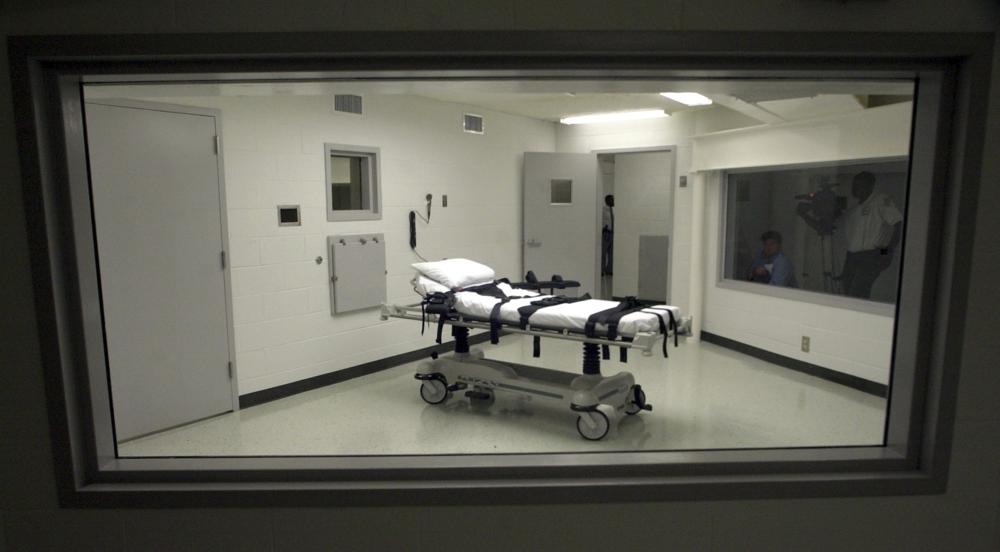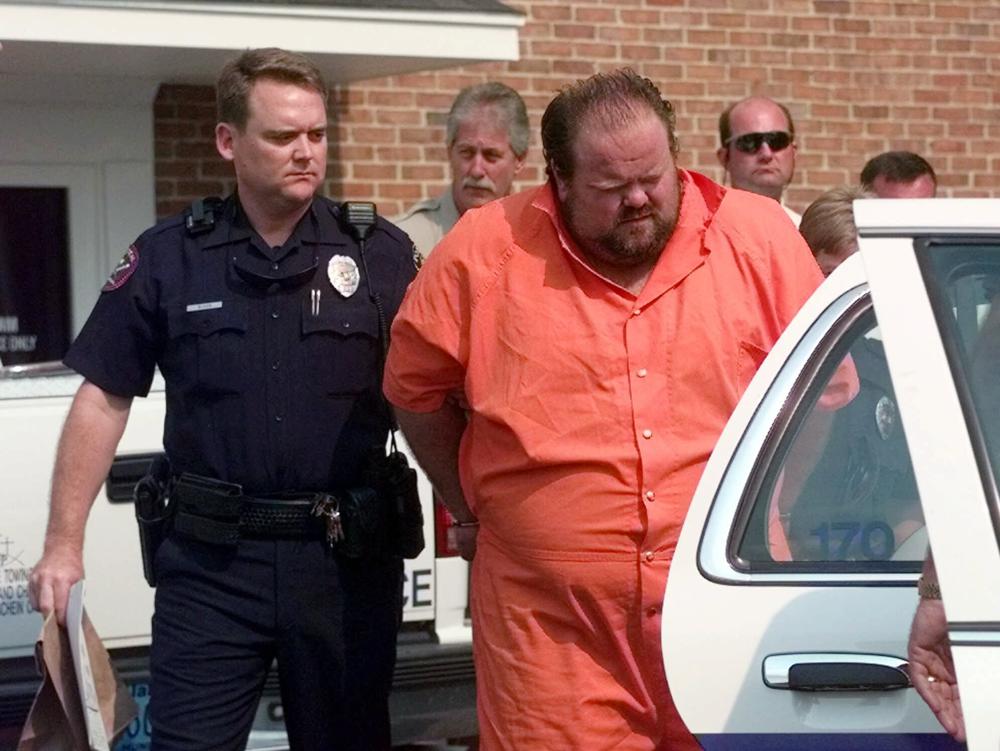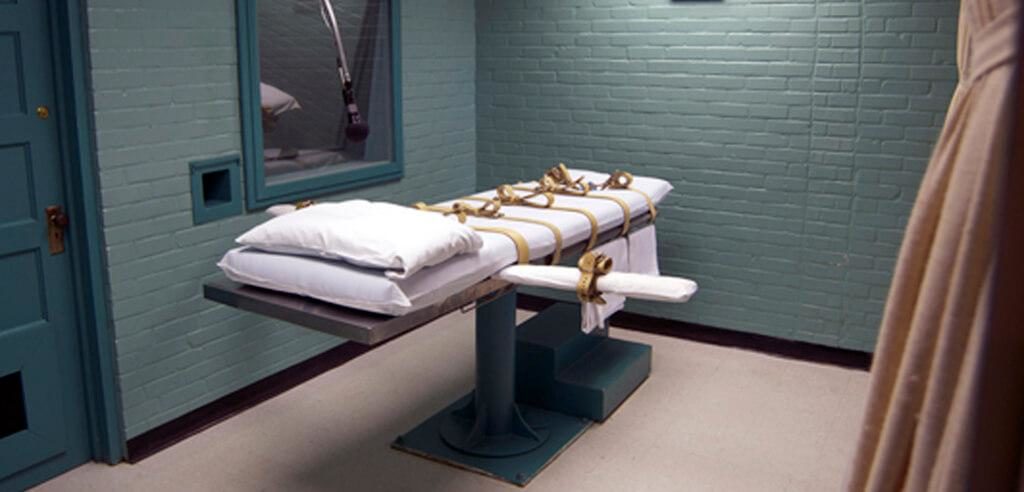Alabama describes proposed nitrogen gas execution; seeks to become first state to carry it out

Alabama’s proposed procedures to carry out executions with nitrogen gas include fitting a mask over the inmate’s face and replacing their breathing air with nitrogen until their heart stops. The state described the procedures for the proposed new execution method in a redacted court filing. Alabama is seeking to become the first state to execute a prisoner using nitrogen. Nitrogen hypoxia has been authorized as an execution method in Alabama, Oklahoma, and Mississippi, but no state has used the method to carry out a death sentence. Nitrogen makes up 78% of the air inhaled by humans and is harmless when inhaled with proper levels of oxygen. Under the proposed execution method of nitrogen hypoxia, an inmate would be forced to breathe only nitrogen, depriving them of oxygen needed to maintain bodily functions and causing them to die. Alabama Attorney General Steve Marshall on Friday asked the Alabama Supreme Court to set an execution date for Kenneth Smith, 58, using nitrogen hypoxia as the method of execution. The attorney general’s office included a redacted copy of the protocol in a court filing asking a judge to dismiss a lawsuit filed by Smith. Smith, in seeking to block the state’s second attempt to execute him by lethal injection, had argued that nitrogen should be available. According to the protocol, the inmate would be escorted into the execution chamber, now used for lethal injections, placed on the gurney, and have a mask fitted over their face. The warden would then read the death warrant and give the inmate a chance to give a final statement up to two minutes long. Execution team members would then make a final inspection of the mask. The warden, from another room, would then “activate the nitrogen hypoxia system.” “After the nitrogen gas is introduced, it will be administered for 15 minutes or five minutes following a flatline indication on the EKG, whichever is longer,” the procedures stated. If Alabama carries out an execution by nitrogen, it will be the first new execution method since lethal injection was introduced in the 1970s. Deborah Denno, a death penalty expert at Fordham Law School, said that unlike lethal injection and electrocution, which have been used for decades, “experts could only speculate about how a state might conduct a nitrogen hypoxia execution.” She said the filed Alabama protocol does not provide answers because of its vagueness and heavy redactions. “This is a vague, sloppy, dangerous, and unjustifiably deficient protocol made all the more incomprehensible by heavy redaction in the most important places,” Denno wrote in an email. John Palombi, an attorney representing several death row inmates, said, “It will be difficult to fully analyze this protocol until a far less redacted version is made available.” “This is a complex procedure, and we have every right to be concerned when the Department of Corrections is not transparent about it, particularly when they have had such a bad track record recently,” Palombi wrote in an email. Alabama attempted to execute Smith by lethal injection last year, but called off the execution because of problems inserting an IV into his veins. It was the state’s second such instance within two months of being unable to put an inmate to death and its third since 2018. The day after Smith’s aborted execution, Gov. Kay Ivey announced a pause on executions to conduct an internal review of lethal injection procedures. The state resumed lethal injections last month. Alabama lawmakers approved nitrogen hypoxia as an alternate execution method in 2018 as death penalty states faced difficulty obtaining lethal injection drugs and ongoing litigation challenging the humaneness of lethal injection. “It’s readily available. It’s 78% of the air we breathe, and it will be a lot more humane to carry out a death sentence,” Trip Pittman, the former Alabama state senator who proposed the new execution method, said. Pittman said the inmate will pass out — similar to how aircraft passengers pass out when a plane depressurizes — and then die. Pittman disputed criticism that the method is experimental. He said that while no state has carried out a death sentence with nitrogen, people have died by breathing nitrogen during industrial accidents and suicide attempts, so the effects are known. Smith was one of two men convicted in the 1988 murder-for-hire slaying of Elizabeth Sennett. The other man convicted in the killing was executed in 2010. Charles Sennett, the victim’s husband and a Church of Christ pastor, killed himself when the investigation began to focus on him as a possible suspect, according to court documents. Republished with the permission of The Associated Press.
Alabama wants to be the 1st state to execute a prisoner by making him breathe only nitrogen

Alabama is seeking to become the first state to execute a prisoner by making him breathe pure nitrogen. The Alabama attorney general’s office on Friday asked the state Supreme Court to set an execution date for death row inmate Kenneth Eugene Smith, 58. The court filing indicated Alabama plans to put him to death by nitrogen hypoxia, an execution method that is authorized in three states but has never been used. Nitrogen hypoxia is caused by forcing the inmate to breathe only nitrogen, depriving them of oxygen and causing them to die. Nitrogen makes up 78% of the air inhaled by humans and is harmless when inhaled with oxygen. While proponents of the new method have theorized it would be painless, opponents have likened it to human experimentation. Alabama authorized nitrogen hypoxia in 2018 amid a shortage of drugs used to carry out lethal injections, but the state has not attempted to use it until now to carry out a death sentence. Oklahoma and Mississippi have also authorized nitrogen hypoxia but have not used it. The disclosure that Alabama is ready to use nitrogen hypoxia is expected to set off a new round of legal battles over the constitutionality of the method. The Equal Justice Initiative, a legal advocacy group that has worked on death penalty issues, said Alabama has a history of “failed and flawed executions and execution attempts” and “experimenting with a never before used method is a terrible idea.” “No state in the country has executed a person using nitrogen hypoxia, and Alabama is in no position to experiment with a completely unproven and unused method for executing someone,” Angie Setzer, a senior attorney with the Equal Justice Initiative, said. Alabama attempted to execute Smith by lethal injection last year, but called off the execution because of problems inserting an IV into his veins. It was the state’s second such instance within two months of being unable to put an inmate to death and its third since 2018. The day after Smith’s aborted execution, Gov. Kay Ivey announced a pause on executions to conduct an internal review of lethal injection procedures. The state resumed lethal injections last month. Smith was one of two men convicted in the 1988 murder-for-hire slaying of a preacher’s wife. The Alabama attorney general argued it is time to carry out the death sentence. “It is a travesty that Kenneth Smith has been able to avoid his death sentence for nearly 35 years after being convicted of the heinous murder-for-hire slaying of an innocent woman, Elizabeth Sennett,” Attorney General Steve Marshall said Friday in a statement. Alabama has been working for several years to develop the nitrogen hypoxia execution method but has disclosed little about its plans. The attorney general’s court filing did not describe the details of how the execution would be carried out. Corrections Commissioner John Hamm told reporters last month that a protocol was nearly complete. A number of Alabama inmates seeking to block their executions by lethal injection, including Smith, have argued they should be allowed to die by nitrogen hypoxia. Robert Grass, an attorney representing Smith, declined to comment Friday. Sennett was found dead on March 18, 1988, in the home she shared with her husband on Coon Dog Cemetery Road in Alabama’s Colbert County. Prosecutors said Smith was one of two men who were each paid $1,000 to kill Sennett on behalf of her husband, who was deeply in debt and wanted to collect on insurance. The slaying, and the revelations over who was behind it, rocked the small north Alabama community. The other man convicted in the killing was executed in 2010. Charles Sennett, the victim’s husband and a Church of Christ pastor, killed himself when the investigation began to focus on him as a possible suspect, according to court documents. Republished with the permission of The Associated Press.
Judge dismisses lawsuit over upcoming lethal injection

A federal judge dismissed an inmate’s claim seeking to block his upcoming execution in Alabama because of reported problems at a recent lethal injection. The judge on Sunday granted Alabama’s request to dismiss the lawsuit brought by Kenneth Eugene Smith, agreeing that Smith waited too long to file the challenge. But U.S. District Judge R. Austin Huffaker Jr. also warned Alabama’s prison commissioner to strictly follow established protocol when officials attempt to put Smith to death next month. “Sanctions will be swift and serious if counsel and the Commissioner do not honor or abide by their representations and stipulations,” Huffaker wrote. Smith is set to be executed by lethal injection November 17 after being convicted in the murder-for-hire killing of Elizabeth Dorlene Sennett, 45. Smith’s attorneys pointed to a July execution, which an anti-death penalty group claims was botched, to argue that Alabama’s lethal injection process creates a risk of cruel and unusual punishment. The July 28 execution of Joe Nathan James Jr. was carried out more than three hours after the U.S. Supreme Court denied a request for a stay. State officials later acknowledged the execution was delayed because of difficulties in establishing an intravenous line but did not specify how long it took. A doctor who witnessed a private autopsy paid for by an anti-death penalty group said it appeared officials might have attempted to perform a “cutdown,” a procedure in which the skin is opened to allow a visual search for a vein. Huffaker noted that Corrections Commissioner John Hamm “represents in his brief and during oral argument that the ADOC did not employ a cutdown procedure or intramuscular sedation during the James execution and denies any present intent to employ any such procedure in the future.” Huffaker ruled that Smith missed the time frame to challenge Alabama’s lethal injection process. Smith missed the 2018 deadline to request execution by nitrogen hypoxia, an execution method that Alabama has authorized but not developed a process to use. Smith’s attorneys argued that the state violated his due process rights by not providing him the information necessary to make a knowing and voluntary waiver of his nitrogen hypoxia election right in 2018. ADVERTISEMENT His attorneys argue that Smith did not know nitrogen hypoxia “would not be implemented for years, if ever.” Huffaker said that complaint also could not overcome a “clear statute-of-limitations hurdle.” Prosecutors said Smith was one of two men paid $1,000 to kill Sennett on behalf of her husband, the Rev. Charles Sennett, who was deeply in debt and wanted to collect on insurance. Smith maintained it was the other man who killed Sennett, according to court documents. Smith was initially convicted in 1989, and a jury voted 10-2 to recommend a death sentence, which a judge imposed. His conviction was overturned on appeal in 1992. He was retried and convicted again in 1996. This time, the jury recommended a life sentence by a vote of 11-1, but a judge overrode the jury’s recommendation and sentenced Smith to death. Alabama no longer allows a judge to override a jury’s recommendation. Republished with the permission of The Associated Press.
Alabama sets execution date for Kenneth Eugene Smith

Alabama has set a November execution date for a man convicted in the 1988 murder-for-hire killing of a pastor’s wife. The scheduled execution follows criticism over the state’s last two lethal injection attempts, including one that was called off after the execution team had trouble finding a vein. Kenneth Eugene Smith, 57, is set to die at Holman Correctional Facility on November 17, according to a Friday order from the Alabama Supreme Court. Smith was sentenced to death for the killing of Elizabeth Dorlene Sennett, a 45-year-old grandmother and pastor’s wife. Prosecutors said Smith was one of two men who were each paid $1,000 to kill Sennett on behalf of her husband, the Rev. Charles Sennett, who was deeply in debt and wanted to collect on insurance. Elizabeth Sennett was found dead on March 18, 1988, in the couple’s home in Colbert County. The coroner testified that she had been stabbed eight times in the chest and once on each side of the neck. The pastor killed himself a week later. Smith maintained it was the other man who stabbed Elizabeth Sennett, according to court documents. Smith was initially convicted in 1989, and a jury voted 10-2 to recommend a death sentence, which a judge imposed. His conviction was overturned on appeal in 1992. He was retried and convicted again in 1996. This time, the jury recommended a life sentence by a vote of 11-1, but a judge overrode the jury’s recommendation and sentenced Smith to death. Alabama no longer allows a judge to override a jury’s recommendation. In 2017, Alabama became the last state to abolish the practice of letting judges override a jury’s sentencing recommendation in death penalty cases, but the change was not retroactive and therefore did not affect death row prisoners like Smith. John Forrest Parker, the other man that prosecutors said was paid to kill Elizabeth Sennett, was executed in 2010. When asked if he had any final words, Parker turned his head to face Mike and Charles Sennett, the victim’s sons, and said, “I’m sorry. I don’t ever expect you to forgive me. I really am sorry.” Alabama last month called off the execution of Alan Miller because of difficulty accessing the inmate’s veins. Alabama Corrections Commissioner John Hamm told reporters that “accessing the veins was taking a little bit longer than we anticipated,” and the state did not have sufficient time to get the execution underway by a midnight deadline. That was at least the third time Alabama has acknowledged problems with venous access during a lethal injection. The state’s July execution of Joe Nathan James took more than three hours to get underway. And, in 2018, Alabama called off the execution of Doyle Hamm after being unable to establish an intravenous line. Republished with the permission of The Associated Press.

